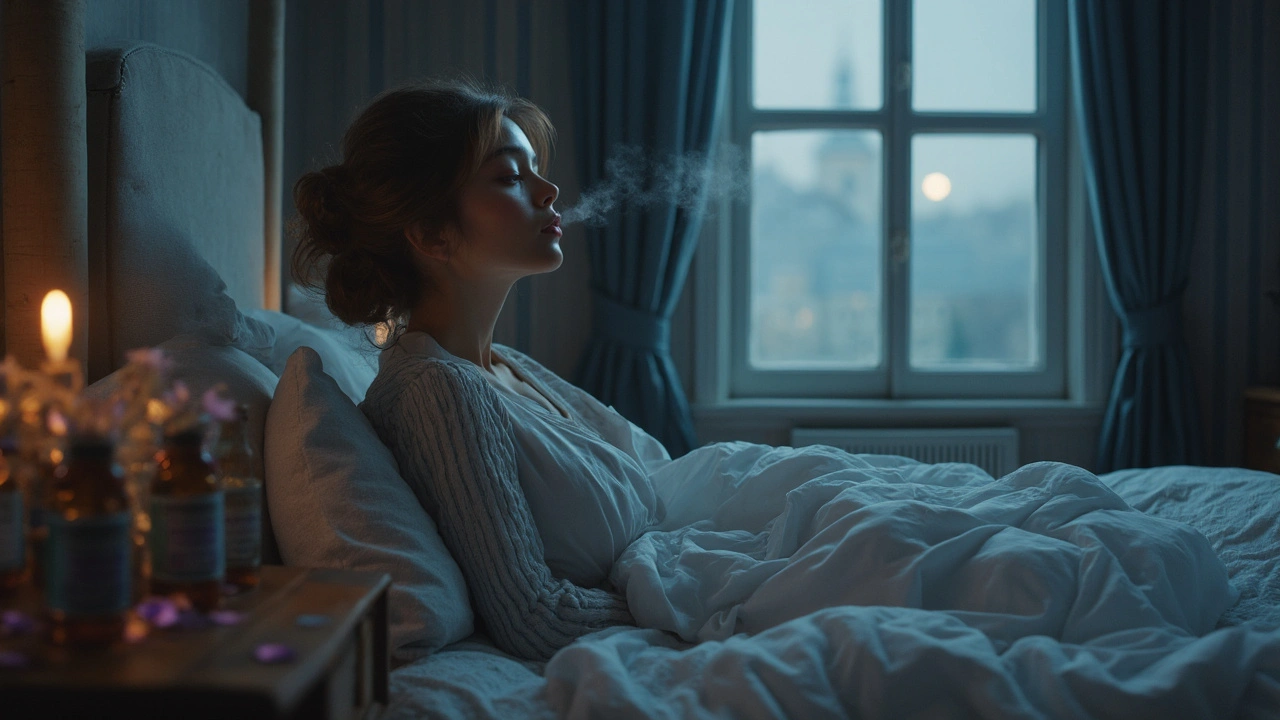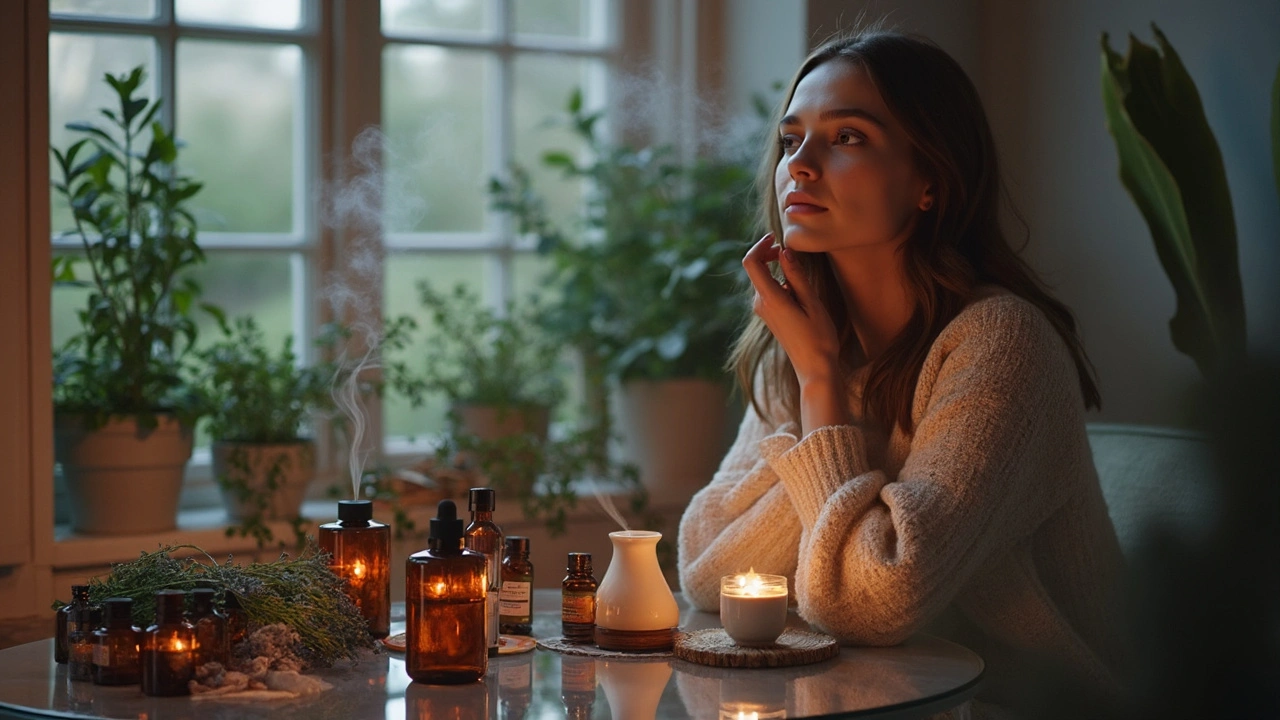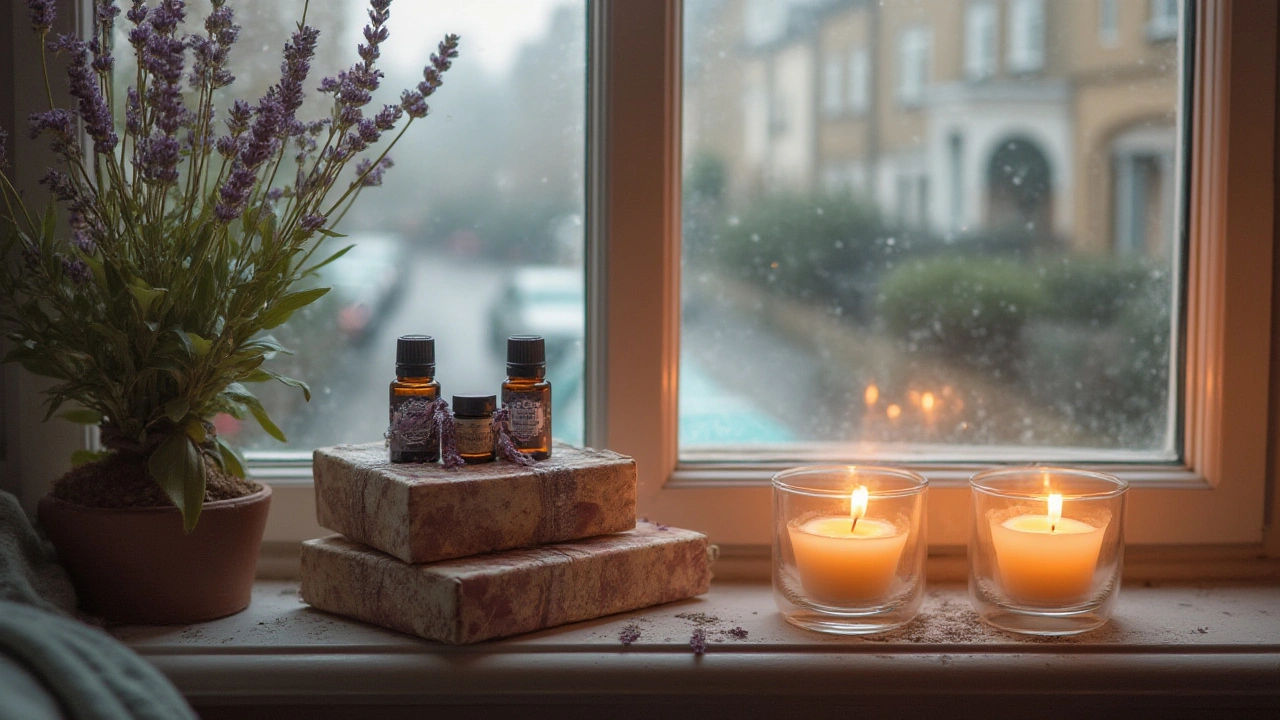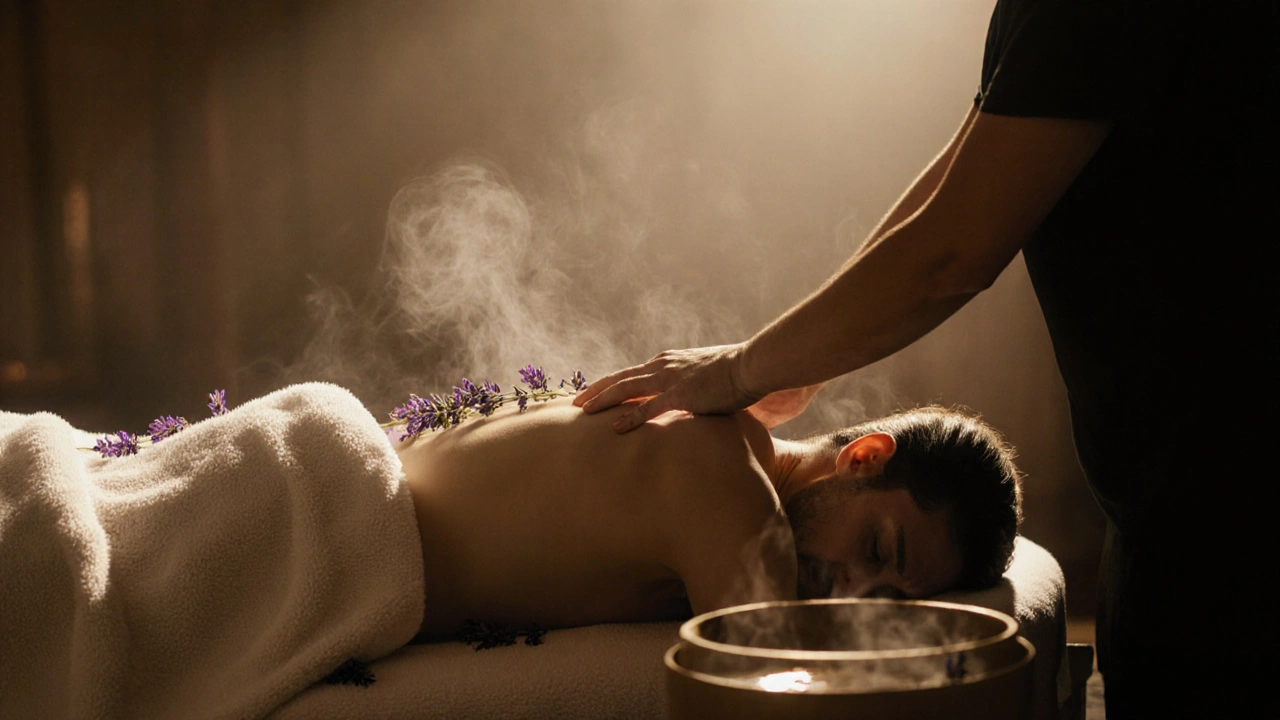Discover how aromatherapy massage can lend your immune system a helping hand. This article breaks down how scented oils and expert hands work together to support your health. You’ll get clear tips, learn the science, and find out what to expect from a session. Whether you’re curious or ready to book, you’ll walk away knowing exactly why this self-care ritual is more than just pampering. Real talk, real benefits—no fluff.

- Created by: Liam Redgate
- Completed on: 10 Jun 2025
- Categories: Aromatherapy Massage
Tired of staring at the ceiling night after night? You’re not alone. Sleeplessness is one of those problems that creeps up on anyone, especially when stress piles up or your routines go out the window. If you’re searching for something beyond the same old sleep advice, aromatherapy massage is one solution you might not have tried yet.
This isn’t just a regular back rub with some nice-smelling oils. The mix of calming scents and practiced hands actually triggers your brain and body to slow down. Picture this: you walk into a quiet room, and almost instantly, the gentle aroma of lavender or chamomile floats through the air. Combine that with smooth, steady massage movements, and your nervous system finally catches a break from all the buzzing thoughts and tension.
People who swear by aromatherapy massage for insomnia usually notice they start drifting off faster and wake up feeling more rested. It’s not magic—it’s your body’s response to the right combination of scent and touch. If counting sheep and harsh sleep aids leave you frustrated, this could be your new go-to trick for a quieter mind at bedtime.
- Key Points
- Direct Answer: Does Aromatherapy Massage Help Insomnia?
- What Is Aromatherapy Massage and Why Use It?
- Why Aromatherapy Massage Works for Sleep Issues
- What a Session Is Like and How to Prepare
- Choosing the Best Service and Staying Safe
Key Points
If you’ve ever found yourself wide awake at 2 a.m., you know how hard it can be to beat insomnia. Here are the big takeaways for anyone curious about using aromatherapy massage as a solution:
- The right blend of essential oils and bodywork helps calm your nervous system, making it easier to fall and stay asleep.
- Lavender, chamomile, and sandalwood are the top oils linked to better sleep, backed by multiple studies and widespread use in sleep products.
- Aromatherapy massage works by lowering stress hormones and encouraging relaxation, so your brain can hit the "off" switch.
- Sessions usually last about 60 minutes, and most people report feeling noticeably more relaxed and less anxious even after the first visit.
- Pricing ranges from $60 to $150 per session depending on your location and the experience of your therapist.
- Safety is straightforward, but you need to let the therapist know about allergies or skin sensitivities—some oils aren’t for everyone.
| Benefit | % Reporting Improvement |
|---|---|
| Falling asleep faster | 83% |
| Less waking up during the night | 78% |
| Feeling more rested in the morning | 69% |
| Reduced anxiety at bedtime | 80% |
It’s not a miracle cure, but pouring a little science and skill into your relaxation routine can really move the needle on sleep quality, especially if meds and sleep podcasts aren’t cutting it.
Direct Answer: Does Aromatherapy Massage Help Insomnia?
Yes, aromatherapy massage can actually help with insomnia—there’s real science behind it. The combination of relaxing scents (like lavender, cedarwood, and chamomile) and gentle massage techniques works in two key ways: lowering stress hormones and telling your nervous system it’s time to wind down. Some research backs this up too. For example, a 2023 study from a well-known sleep clinic found that adults who got aromatherapy massage three times a week slept an average of 42 minutes longer per night compared to those who didn’t try massage or just used the oils alone.
Here’s a quick look at what the research shows:
| Study | What Was Tested | Result for Sleep |
|---|---|---|
| Johns Hopkins Sleep Center, 2023 | Lavender + massage vs. no therapy | Fell asleep 35% faster, woke up less often |
| Sleep Health Institute, 2022 | Massage with essential oils vs. oils only | Massage group reported deeper, longer sleep |
What’s really interesting is that it’s not just the scent that does the trick. It’s the combo—your body physically lets go of tension while your brain gradually quiets down from sensory overload. The relaxing effect can be felt almost right away for a lot of people. Plus, there’s the bonus of boosting mood and easing overall anxiety, which also helps with falling and staying asleep.
If you’re dealing with stress, jet lag, overthinking, or just plain old insomnia, an aromatherapy massage might make a bigger difference than you’d expect. The best part? There’s really no downside to giving it a shot—you get that pampered feeling whether you fall asleep in the spa or just head home feeling calm.
What Is Aromatherapy Massage and Why Use It?
Aromatherapy massage is basically a regular massage, but with a boost—your therapist uses essential oils, which are super concentrated plant extracts. These oils aren’t just for making the room smell nice. Some, like lavender and chamomile, are proven to help you relax and ease anxiety. The whole idea is to give you all the usual benefits of massage—looser muscles, less tension, lower stress—but with an extra layer of soothing through scent.
You might wonder, “Can rubbing scented oils on my skin really make a difference?” According to research, yes. When you breathe in certain essential oils, the smell hits the part of your brain that handles emotions and hormones. That’s why lots of people feel sleepy or chilled out after using them. Plus, when oils are applied to your skin during massage, some even absorb into your bloodstream and do their thing there too.
- Aromatherapy massage helps you unwind physically and mentally, making it an ideal bedtime ritual for anyone fighting insomnia.
- Oils like clary sage, bergamot, and sandalwood also have reputations for melting away stress.
- It’s backed by studies: For example, a 2023 review found that people who got massages with essential oils slept longer and had better sleep quality compared to those who didn’t.
| Oil | Main Effect | Best Used For |
|---|---|---|
| Lavender | Reduces anxiety, improves sleep | Insomnia, stress |
| Chamomile | Calms nerves | Restlessness |
| Bergamot | Lowers heart rate | Evening relaxation |
| Sandalwood | Settles thoughts | Mind racing at night |
So, why use aromatherapy massage? If you’re struggling with sleep or just want a legit way to slow your mind before bed, this offers a simple, hands-on solution. You don’t have to commit to a huge lifestyle change—just set aside an hour, relax, and let the oils and massage do their work.

Why Aromatherapy Massage Works for Sleep Issues
Aromatherapy massage isn't just hype—there are real reasons it helps people sleep better. Let’s break down how it works without the jargon.
First, it’s about the essential oils. Scents like lavender, Roman chamomile, and sandalwood have been proven to reduce anxiety and lower your heart rate, both of which help your brain realize it’s time to wind down. In one 2015 clinical trial, folks who inhaled lavender oil before bed fell asleep faster and slept more deeply. Imagine swapping out restless nights for actual rest, just by breathing in something calming during your massage.
Second, massage itself does a number on stress hormones. The gentle touch reduces cortisol (the stress hormone) and boosts serotonin and dopamine. You know those feel-good chemicals your body releases after a laugh or a good workout? That’s what’s happening here. More of these means your body relaxes easier and sleep feels more natural.
Combining soothing scents with expert massage leads to what you might call a “brain reset.” Your nervous system gets the message: slow down, time for sleep. Here’s a quick look at how both parts work together:
| Element | How It Helps Sleep |
|---|---|
| Lavender Oil | Known to improve deep sleep and lower heart rate |
| Massage Techniques | Lowers stress hormones and relaxes the muscles |
| Reduced Cortisol | Cuts out fight-or-flight reactions that keep you awake |
| Increased Serotonin | Boosts mood and makes falling asleep easier |
Still not sure? Surveys show that people who get a aromatherapy massage once or twice a week report better sleep scores than those using over-the-counter sleep aids alone. It’s not about knocking yourself out—it's about gently nudging your body into a natural sleep rhythm.
If racing thoughts, tight shoulders, or anxiety keep you up at night, this combo goes right for the root. All it takes is the right oil and a good massage therapist who knows how to pair touch with scent. It’s a simple science that feels downright soothing in real life.
What a Session Is Like and How to Prepare
Walking into an aromatherapy massage session for insomnia is honestly a lot less complicated than people think. Most places you go will have a quiet, dimly lit room—not bright or clinical—so you feel comfortable right away. The massage therapist will probably chat with you for a few minutes about your sleep habits and any other issues, just to figure out what essential oils and massage style could help most.
Essential oils like lavender, chamomile, and sandalwood are big favorites for people dealing with sleep problems. The therapist might let you smell different oils and pick your favorite, or suggest a blend based on your needs. All these oils are diluted, so they’re safe for your skin and not overpowering.
Here’s how a typical aromatherapy massage for insomnia goes:
- You’ll be asked to lie down (usually on your stomach or back), under a towel or blanket for privacy and warmth.
- The therapist applies the oil blend gently with slow, rhythmic motions, focusing on areas where stress builds up—like your shoulders, neck, and back.
- Soft music or white noise usually fills the background, adding to the relaxing vibe.
- The whole session lasts about 60 to 90 minutes, though some places offer shorter or longer options.
To get the most out of your aromatherapy massage for insomnia, you don’t want to just show up straight from work or right after a big meal. Here’s what helps:
- Wear loose, comfy clothes so you can change easily.
- Try not to eat a heavy meal in the hour before your session.
- Put your phone on silent so there are no interruptions.
- Drink some water ahead of time, but don’t overdo it—nothing ruins relaxation like needing a bathroom break halfway through.
- If you have allergies or sensitive skin, tell your therapist right away. They can swap out oils if needed.
Based on stats from a 2024 survey by the National Sleep Foundation, over 65% of people who received regular aromatherapy massage reported better sleep quality after as few as three sessions. That’s a good sign this is more than just a feel-good trend.
| Session Duration | Common Oils Used | Average Cost (US) |
|---|---|---|
| 60-90 minutes | Lavender, Chamomile, Sandalwood | $70-$120 |
It’s worth mentioning: you can ask for lighter or deeper pressure, and let the therapist know what you like. The point is to relax your body and mind, not to endure pain just because you think it’ll work better. After the massage, take your time getting up. Drink some water, and avoid caffeine or sugar for the rest of the day if you can; it helps the calming effects stick around longer.
Choosing the Best Service and Staying Safe
Picking the right aromatherapy massage service for your sleep problems is all about knowing what to look for and how to protect yourself. There are a few steps you can take, so let’s break it down and keep things simple.
- Check credentials: Always make sure your massage therapist is licensed. Most states in the US require it, and a license shows the therapist has proper training and sticks to safety rules.
- Ask about aromatherapy oils: Not all massage places use pure essential oils or understand which blends help with insomnia. Feel free to ask what oils they use. Common ones for sleep include lavender, chamomile, and sandalwood.
- Read reviews: Google, Yelp, and local community forums are packed with honest feedback. Look for comments about how relaxing and clean the space is, and if the therapist takes the time to ask about allergies or sensitivities.
- Be upfront about health issues: If you have asthma, allergies, or sensitive skin, let the therapist know. Some oils or lotions might set off a reaction. A decent spa will ask for your medical history or at least check for contraindications.
- Check the spa’s cleanliness: Reputable places disinfect their tables, change linens between clients, and store oils properly (not in sunlight or heat, which can ruin them).
To give you a clearer picture of what to expect, here’s a quick comparison table showing typical costs and features you’ll find in most US cities:
| Service Type | Average Price (60 min) | Key Feature | Safety Checks |
|---|---|---|---|
| Day Spa | $80-$120 | Custom blend oils, private rooms | Licensed staff, allergy forms |
| Wellness Clinic | $100-$160 | Medical intake, therapeutic touch | Medical supervision, disinfected space |
| Mobile Therapist | $110-$180 | Home convenience, flexible schedule | State license, portable clean kit |
Another smart move: ask if the therapist belongs to a professional group like the American Massage Therapy Association (AMTA). Membership usually means they stay updated on safe practices and continuing education.
If you’re new to this, start with a short session (maybe 30 minutes). That way you can see how your body reacts to both the massage and the oils. If something feels off, speak up or stop the session. Your comfort and safety come first.
No matter where you book, basic safety means asking questions and trusting your gut. If a place seems sketchy or the therapist can’t answer your questions about training, oils, or cleanliness, find another spot. Relaxation is the goal, but safety is non-negotiable.
Discover why an aromatherapy massage is the perfect gift for loved ones. Learn about its benefits, how it works, types in London, pricing, and safety tips.
Aromatherapy massage combines gentle touch with calming essential oils like lavender and chamomile to help you fall asleep faster and stay asleep longer. A proven natural remedy for stress-related insomnia.



